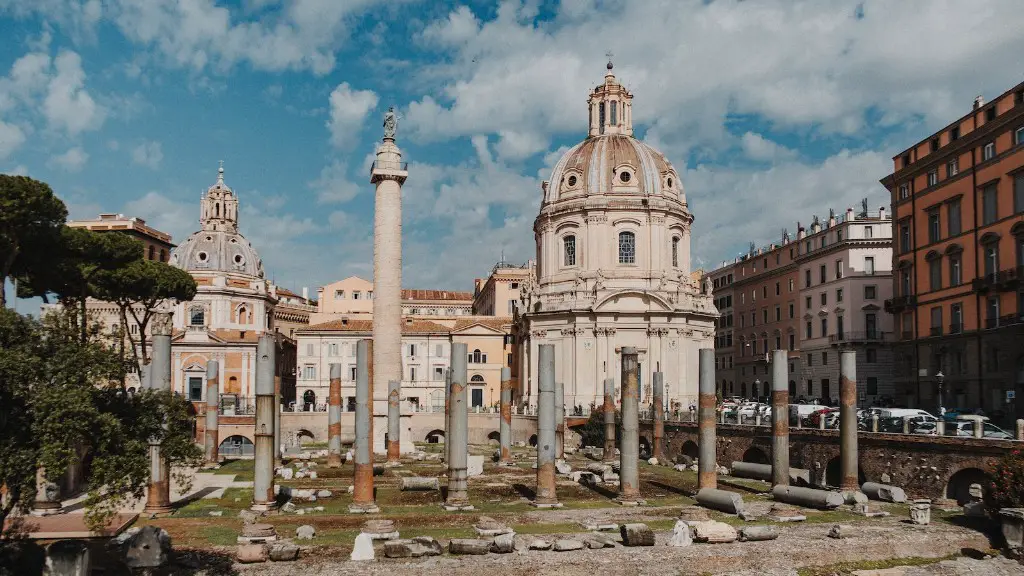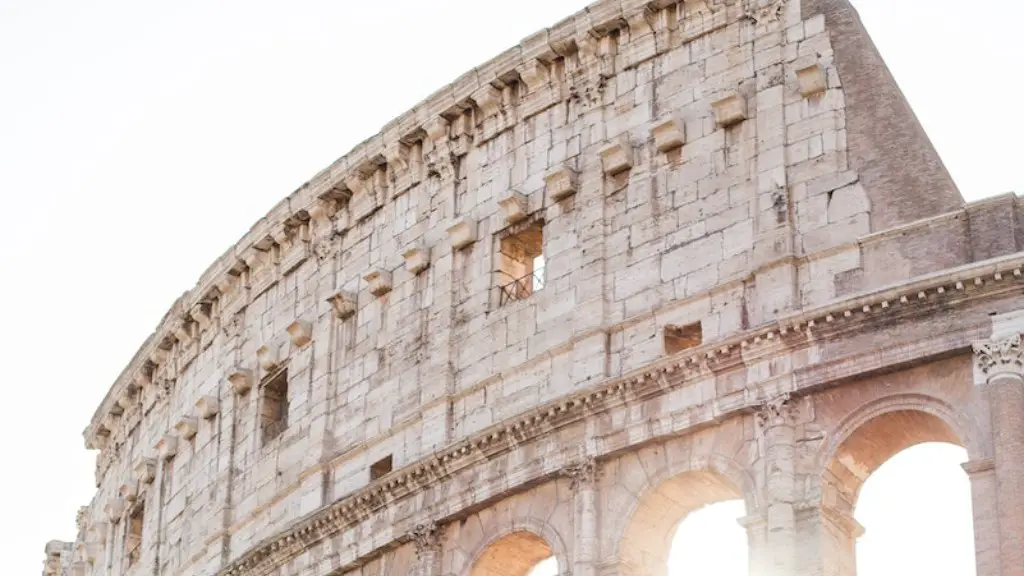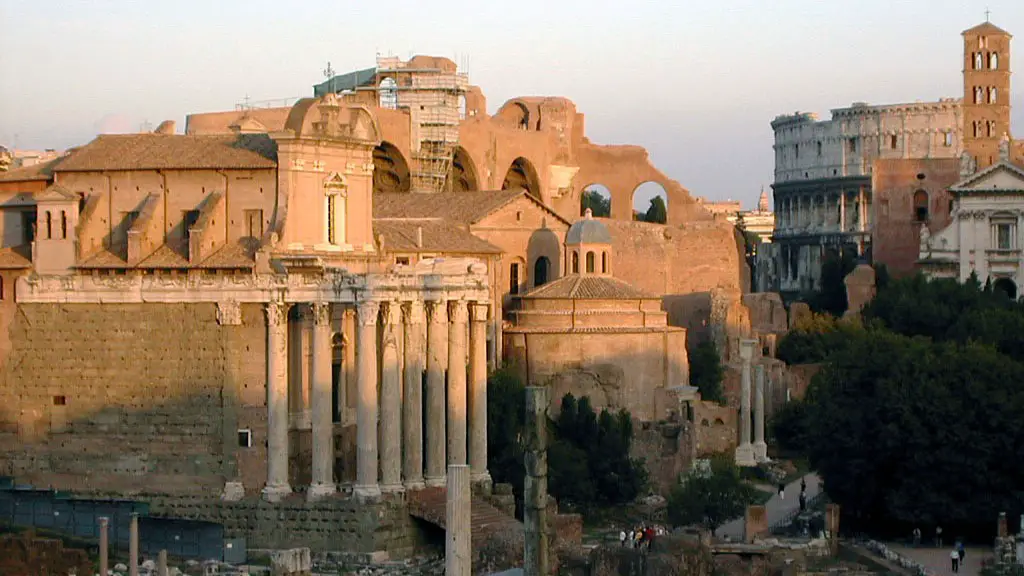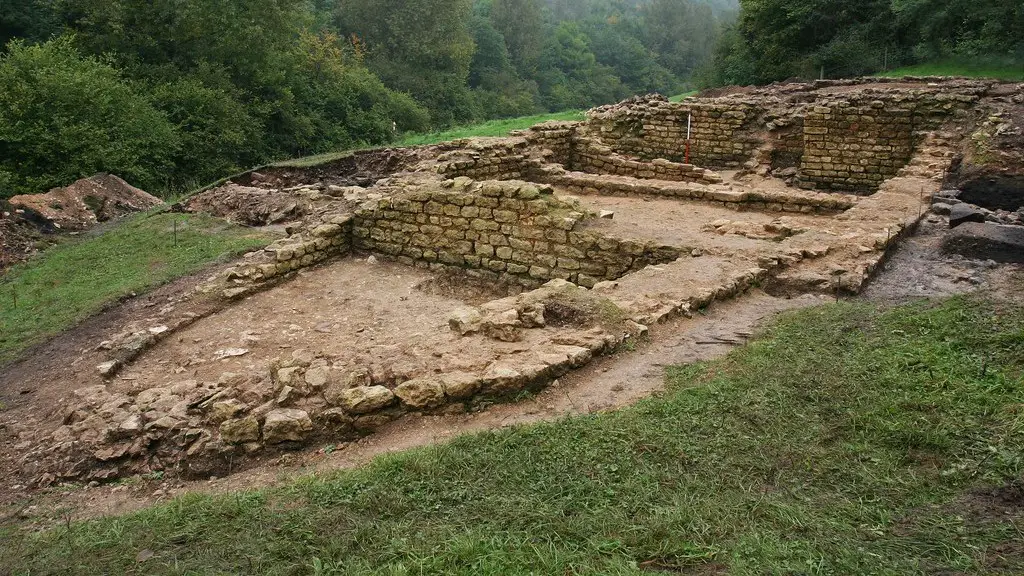Overview of Ancient Roman Religion
Ancient Rome was an ancient civilization that was heavily influenced by religion, and the government of Rome played a major role in shaping the religious landscape of the Empire. Religion in ancient Rome included a complex pantheon of gods, goddesses, and spirits, as well as beliefs, ceremonies, and religious practices that were shared among Roman citizens. These gods and goddesses linked to myths and stories associated with human life and events. Furthermore, religion also supported the political functions of the Roman state, as well as being an important element of Roman culture.
Government Role in Promotion and Regulation of Religion
The government in ancient Rome instituted laws and regulations related to the practice of religion. In many cases, government officials and religious leaders worked together to ensure that citizens followed the appropriate customs and traditions. For example, Roman laws included regulations that declared certain activities illegal, such as the worship of foreign gods, and the practice of manipulating or defacing religious images. In some cases, these laws also prescribed punishments for violation of these statutes. Moreover, the government had the power to grant special favors or privileges to certain gods and goddesses, as well as to grant social and economic benefits to those citizens who practiced the proper customs and rituals.
The government also had a role in shaping the religious landscape of the Empire by promoting certain gods over others and introducing new religious ceremonies. For example, the Emperor Augustus promoted the cult of the goddess Roma, whose cult symbol was the she-wolf that nursed the legendary founders of Rome, Romulus and Remus. In addition, the Emperor Nero introduced a festival dedicated to Apollo and instituted the celebration of his own birthday as a holiday. Furthermore, Augustus declared that the worship of the god Jupiter had superior legal status in the Roman state and vested the Temple of Jupiter on the Capitoline Hill with special privileges.
The Cult of the Emperor
A notable example of how the government in ancient Rome sought to influence religion was the promotion and establishment of the cult of the emperor. This involved the worship of the emperor as a living god and was an attempt to solidify the political authority of the emperor. For example, Augustus declared that he was the son of the goddess Athena and that he was intended to restore order to the world. Augustus also sought to use the cult of the emperor to legitimize his rule and to promote political loyalty among Roman citizens. Furthermore, the cult of the emperor was used to encourage veneration of the emperor’s speech and image, as well as to bolster support for certain political agendas. In addition, the Cult of the Emperor also provided a way for successful military leaders and politicians to be deified after their deaths.
Exemptions from Obligations of Religion
In some cases, the government in ancient Rome also sought to limit the influence of religion in certain aspects of public life. For example, the Senate could grant exemptions from the duties and obligations of religion to certain individuals. This could include exemptions from religious festivals, the payment of temple dues, or the responsibility to observe religious purity. Moreover, the Senate could also grant exemptions from the payment of certain temple taxes or allow individuals to hold offices that were normally closed to those of lower rank. This could be done to reward individuals for loyalty or service to the state as well as to avert political unrest.
Conclusion of Government’s Role in Ancient Roman Religion
Overall, the government in ancient Rome played an important role in shaping the religious landscape of the Empire. Through laws and regulations, the government regulated and promoted certain religious customs and ceremonies, and established the cult of the emperor as a way to bolster political loyalty. Furthermore, the government also sought to limit the influence of religion in certain aspects of public life by granting exemptions from certain religious duties and obligations. Thus, religion was an integral part of Roman life and the government sought to harmoniously integrate it into the civic, social, and political life of Roman citizens.
Effects of Government’s Role in Ancient Roman Religion in Modern Society
The influence of the government’s role in religion in Ancient Rome can be seen in the way governments and states define freedom of religion today. For example, many modern governments are based on the principle of secularism, which is a concept which rests on the belief that government should be neutral towards religious belief systems. This ideal was not present in Ancient Rome, and the government’s role in religion was often used to manipulate public opinion and bolster support for certain institutions and ideologies. Furthermore, the concept of the separation of church and state, which is often taken for granted in the modern world, is a largely foreign concept in Ancient Rome.
The government’s role in Ancient Roman Religion also has implications for our understanding of power, authority, and privilege in the modern world. In Ancient Rome, religion was heavily controlled and regulated by the state, and powerful individuals were permitted to make use of religious customs and ceremonies to promote their agendas. This can be seen in the modern world, with powerful individuals using religious ideology to support their own power and authority. Additionally, the state often grants special privileges and rights to certain religious groups but can deny them to others, which is often seen in debates surrounding education, healthcare, and labor rights.
Differing Perspectives on Government Role in Ancient Roman Religion
There are a variety of perspectives on the role of the government in Ancient Roman Religion. Some scholars view Ancient Rome as an oppressive state in which religion was exploited in order to maintain political and social control over citizens. On the other hand, other scholars view Ancient Rome as a tolerant and enlightened society which respected and protected its citizens’ religious beliefs and practices. Scholars may also disagree on the legitimacy and legality of certain religious practices and laws during this period.
These differing perspectives can also be seen in contemporary societies, with debates concerning the role of religion in modern politics. In some countries, the government works to protect religious freedom and promote religious pluralism, while in others, the government may limit or restrict certain religious beliefs and practices. This can be seen in the debate surrounding the teaching of creationism in some public schools in the United States, as well as in the debate concerning the right to wear religious symbols in the workplace in France.
Modern Government Influence on Religion
It is clear that the government’s role in religion in Ancient Rome continues to have an impact on contemporary societies. Religion continues to play an important role in many countries, with some governments heavily restricting or promoting certain religious practices and beliefs. In addition, many countries have laws which protect religious freedoms, as well as laws which limit certain religious practices. In some cases, governments may favor one religion over another, or forbid certain religious symbols from the public sphere. Thus, the government’s role in Ancient Roman Religion continues to have a significant influence on modern societies.
Evolution of Government Role in Religion
The government’s role in religion in Ancient Rome has evolved over time. Today, many countries seek to protect the freedom of religious belief and practice while also ensuring that religion is not used to oppress citizens or to promote certain political agendas. Furthermore, the principle of secularism is widely accepted in many countries, and the rights of religious minorities are often protected by law. The government’s relationship with religion has changed significantly since Ancient Rome, and these changes reflect the changing values of modern societies.
Controversies in Government Role in Religion
The government’s role in religion continues to be a subject of controversy in many countries. In particular, the issue of religious minorities being granted equal rights and protections has been a contentious one. In some countries, the government has been accused of promoting certain religious beliefs, while in others, it has been accused of favoring one religion over another. Additionally, some countries have laws which forbid certain religious practices and symbols, such as veiling for Muslim women in France. These issues have sparked protests, debates, and legal challenges, demonstrating that the government’s role in religion remains relevant and controversial in the modern world.



